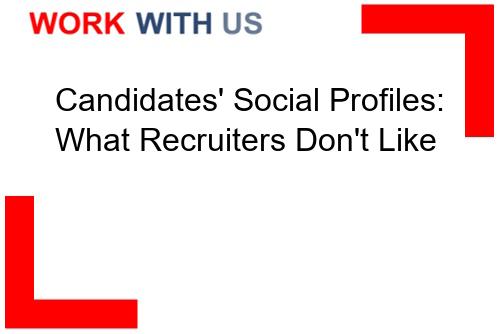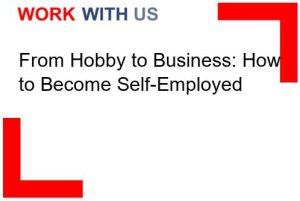In today’s digital age, social media has become an integral part of our daily lives. From sharing personal updates to networking with professionals, platforms like Facebook, Twitter, and LinkedIn have revolutionized the way we communicate and connect with others. However, when it comes to job hunting, candidates‘ social profiles can either make or break their chances of landing a job.
Recruiters are increasingly turning to social media to screen potential candidates before making hiring decisions. While a strong online presence can showcase a candidate’s skills, experience, and personality, there are certain red flags that recruiters look out for when reviewing social profiles. These red flags can range from unprofessional content to inappropriate behavior, and they can significantly impact a candidate’s chances of being considered for a job.
One of the biggest turn-offs for recruiters is unprofessional or inappropriate content on a candidate’s social media profiles. This can include offensive language, discriminatory remarks, or inappropriate photos and videos. Recruiters are looking for candidates who present themselves in a professional manner both online and offline, so any content that goes against this image can be a major red flag.
Another thing that recruiters don’t like to see on social profiles is evidence of poor judgment or questionable behavior. This can include posts about illegal activities, negative comments about previous employers, or public disagreements with colleagues. Recruiters want to hire candidates who are reliable, trustworthy, and able to handle themselves professionally in any situation, so any behavior that raises doubts about a candidate’s character can be a cause for concern.
In addition to unprofessional content and questionable behavior, recruiters also pay attention to how candidates present themselves online. This includes the quality of their profile picture, the consistency of their personal brand across different platforms, and the overall tone and language used in their posts. Recruiters are looking for candidates who are able to effectively communicate their skills and experience, so a poorly curated social media presence can give off the wrong impression.
Furthermore, recruiters also take into consideration how active candidates are on social media and whether they engage with industry-related content. A lack of activity or engagement can signal a lack of interest or passion for the field, which can be a red flag for recruiters looking for candidates who are dedicated and enthusiastic about their work.
Overall, candidates should be mindful of what they post on their social media profiles and how they present themselves online. Recruiters are paying close attention to these platforms, and any red flags can quickly disqualify a candidate from consideration. By maintaining a professional and positive online presence, candidates can increase their chances of impressing recruiters and landing their dream job.
Red flags in candidates’ social profiles: a recruiter’s guide
In today’s digital age, recruiters have a powerful tool at their disposal when it comes to evaluating potential candidates: social media profiles. With the prevalence of platforms like LinkedIn, Facebook, Twitter, and Instagram, recruiters can gain valuable insights into a candidate’s personality, interests, and professional background. However, while social media can be a valuable resource, it can also be a minefield of red flags that recruiters need to be aware of.
One of the most common red flags that recruiters should look out for is inappropriate or offensive content on a candidate’s social media profiles. This can include anything from discriminatory language or behavior to inappropriate photos or comments. Recruiters need to remember that a candidate’s social media presence is a reflection of their personal brand, and any content that could be deemed offensive or unprofessional could reflect poorly on the candidate and the company they represent.
Another red flag to watch out for is inconsistencies between a candidate’s social media profiles and their resume. Recruiters should pay close attention to details such as job titles, dates of employment, and responsibilities listed on a candidate’s LinkedIn profile compared to what is stated on their resume. Any discrepancies could be a sign that the candidate is being dishonest or exaggerating their qualifications, which is a major red flag for recruiters.
Recruiters should also be wary of candidates who have a history of negative interactions or conflicts on social media. This could include engaging in arguments or disputes with others, making derogatory comments about previous employers or colleagues, or displaying a generally negative attitude online. Recruiters should consider how a candidate’s behavior on social media could impact their ability to work effectively with others and represent the company in a positive light.
In addition to negative behavior, recruiters should also be on the lookout for signs of unprofessionalism on a candidate’s social media profiles. This could include things like spelling and grammar errors in posts, inappropriate language or slang, or a lack of discretion when sharing personal information. Recruiters should remember that professionalism is key in the workplace, and any behavior that suggests a lack of professionalism on social media could be a red flag for recruiters.
Recruiters should also pay attention to how a candidate presents themselves on social media in terms of their personal brand. This includes things like the types of content they share, the language they use, and the overall image they project online. Recruiters should consider whether a candidate’s social media presence aligns with the company’s values and culture, and whether it reflects positively on the candidate as a potential employee.
Another red flag for recruiters to watch out for is a lack of engagement or activity on a candidate’s social media profiles. While some candidates may choose to keep a low profile online, a complete absence of activity could be a sign that the candidate is not tech-savvy or up-to-date with current trends in social media. Recruiters should consider whether a candidate’s lack of engagement on social media could impact their ability to effectively communicate and collaborate in a digital workplace.
Recruiters should also be cautious of candidates who have a large number of connections or followers on social media but lack meaningful engagement or interactions with their network. This could be a sign that the candidate is more focused on quantity over quality when it comes to building their online presence, which could be a red flag for recruiters. Recruiters should consider whether a candidate’s social media connections are genuine and relevant to their professional network.
In conclusion, social media can be a valuable tool for recruiters to evaluate potential candidates, but it also comes with its own set of red flags that recruiters need to be aware of. By paying attention to things like inappropriate content, inconsistencies, negative behavior, unprofessionalism, personal branding, engagement, and network quality on a candidate’s social media profiles, recruiters can make more informed decisions about who to bring on board. Ultimately, being vigilant and thorough in evaluating candidates’ social media profiles can help recruiters avoid potential pitfalls and ensure they are selecting the best candidates for the job.
The impact of inappropriate content on candidates’ social profiles
In today’s digital age,
candidates‘ social profiles
play a crucial role in shaping their professional image. Employers often turn to social media platforms to gain insight into a candidate’s personality, values, and behavior outside of the traditional interview process. However, cannot be underestimated.
The presence of inappropriate content on a candidate’s social profiles can have serious consequences on their job prospects. Employers are increasingly using social media screenings as part of their hiring process, and any
questionable content
can raise red flags and lead to a candidate being disqualified from consideration. Inappropriate content can range from offensive language, discriminatory remarks,
inappropriate photos
, to posts that showcase unprofessional behavior.
Inappropriate content
on social profiles can also damage a candidate’s reputation and credibility. In today’s interconnected world, information spreads quickly, and
negative content
can tarnish a candidate’s image for years to come. Even if the content is deleted, there is no guarantee that it has not been captured or shared by others, leading to a lasting impact on the candidate’s professional reputation.
Candidates must be mindful of the content they post on their social profiles and ensure that it aligns with the image they want to portray to potential employers. It is essential to think twice before posting anything online and to consider how it may be perceived by others. Employers are increasingly looking for candidates who demonstrate
professionalism
and good judgment both in person and online.
In conclusion
, cannot be overstated. It is crucial for candidates to be aware of the potential consequences of their online presence and to take steps to ensure that their social profiles reflect their best selves. By being mindful of the content they post and maintaining a professional image online, candidates can enhance their job prospects and avoid any negative repercussions that may arise from inappropriate content.
How candidates’ social profiles can make or break their job prospects
In today’s digital age, employers are increasingly turning to candidates‘ social media profiles to gain insight into their personalities, values, and overall fit for a position. While a well-crafted resume and polished interview skills are still important, a candidate’s online presence can often make or break their job prospects.
One of the key ways in which candidates’ social profiles can impact their job prospects is through the content they choose to share. Employers are likely to be turned off by posts that are offensive, inappropriate, or unprofessional. This includes anything from discriminatory language to excessive partying photos. Candidates should be mindful of the image they are projecting online and ensure that their social media presence reflects the image they want to convey to potential employers.
In addition to the content of their posts, candidates should also pay attention to how they interact with others on social media. Employers may be put off by candidates who engage in online arguments, use offensive language, or demonstrate poor communication skills. On the other hand, candidates who are able to engage in respectful and thoughtful discussions online may be viewed more favorably by potential employers.
Another important aspect of candidates’ social profiles is their privacy settings. While it may be tempting to keep profiles public in order to showcase accomplishments and experiences, candidates should be aware that employers may still be able to access their profiles even if they are not connected online. It is important for candidates to review their privacy settings and consider what information they are comfortable sharing with the public.
Candidates should also be mindful of the overall tone of their social media profiles. Employers are likely to be more impressed by candidates who present themselves in a positive and professional manner. This includes using proper grammar and spelling, avoiding excessive use of emojis or slang, and showcasing their accomplishments and interests in a thoughtful and engaging way.
On the flip side, candidates who come across as negative, unprofessional, or disengaged on social media may find themselves at a disadvantage when it comes to job opportunities. Employers want to hire candidates who will represent their company well and who demonstrate a positive attitude and strong work ethic both online and offline.
In addition to the content of their posts, candidates should also consider the overall image they are presenting on social media. This includes their profile picture, cover photo, and bio. Candidates should choose images that are professional and appropriate for a work setting, and ensure that their bio accurately reflects their skills, experience, and interests.
Candidates should also be aware of the potential impact of their social media activity on their job prospects. Employers may use social media to conduct background checks on candidates, and any red flags that arise during this process could result in a candidate being passed over for a job. It is important for candidates to be mindful of the content they are sharing online and to consider how it may be perceived by potential employers.
Overall, candidates’ social profiles can have a significant impact on their job prospects. By being mindful of the content they share, how they interact with others, their privacy settings, and the overall tone of their profiles, candidates can increase their chances of impressing potential employers and landing their dream job. In today’s competitive job market, a strong social media presence can be a valuable asset for candidates looking to stand out from the crowd and secure their next career opportunity.
Strategies for candidates to clean up their social profiles before job hunting
In today’s digital age,
candidates must be mindful of their online presence
when job hunting.
Employers often conduct social media screenings
to get a better sense of a candidate’s personality and professionalism.
Having a clean and professional social media profile can make a significant impact on a candidate’s job prospects
. Here are some .
1. Conduct a thorough audit of all social media accounts
Before starting the job search,
candidates should review all of their social media accounts
. This includes platforms such as Facebook, Twitter, Instagram, LinkedIn, and any other accounts they may have.
Candidates should carefully examine their posts, photos, comments, and likes
to ensure that everything is appropriate and professional.
They should also check their privacy settings to control who can see their content
.
2. Remove or untag inappropriate content
If
candidates come across any posts, photos, or comments that could be deemed inappropriate or unprofessional
, they should delete them immediately.
Candidates should also untag themselves from any posts or photos that they do not want potential employers to see
.
It’s important to remember that once something is posted online, it can be difficult to completely erase it
.
Candidates should think twice before posting anything that could potentially harm their job prospects
.
3. Update profile information
Candidates should
ensure that their profile information is up to date and accurate
. This includes their work history, education, skills, and contact information.
Having a complete and professional profile can make a candidate more attractive to potential employers
.
Candidates should also consider updating their profile pictures to reflect a professional image
.
4. Showcase relevant skills and experiences
Candidates can
use their social media profiles to showcase their skills and experiences
.
They can share articles, projects, or achievements that demonstrate their expertise in their field
.
Candidates should also engage with industry-related content and participate in discussions to show their knowledge and passion for their work
.
Employers appreciate candidates who are active and engaged in their industry
.
5. Monitor online reputation
Candidates should
regularly monitor their online reputation
.
They can set up Google alerts for their name to receive notifications whenever they are mentioned online
.
Candidates should also respond promptly and professionally to any negative comments or reviews
.
It’s important to maintain a positive online reputation as it can impact a candidate’s job search
.
The importance of a professional online presence
In today’s digital world,
a candidate’s online presence can make or break their job prospects
.
Employers often use social media screenings as part of their hiring process
.
Having a clean and professional social media profile can give candidates a competitive edge
.
It shows employers that the candidate is responsible, professional, and mindful of their online image
.
Building a personal brand
Candidates can
use their social media profiles to build a personal brand
.
By sharing relevant content, engaging with industry leaders, and showcasing their skills and experiences, candidates can establish themselves as experts in their field
.
A strong personal brand can attract job opportunities and help candidates stand out from the competition
.
Networking on social media
Social media platforms are
great tools for networking
.
Candidates can connect with industry professionals, recruiters, and potential employers
.
By engaging with their network and participating in discussions, candidates can expand their professional connections and increase their job prospects
.
Networking on social media can lead to job opportunities that may not be advertised elsewhere
.
Leveraging social media for job search
Candidates can
use social media to search for job opportunities
.
Many companies post job openings on platforms like LinkedIn, Facebook, and Twitter
.
Candidates can follow companies they are interested in, join industry-specific groups, and set up job alerts to stay informed about new opportunities
.
Social media can be a valuable tool for finding and applying for jobs
.
Staying authentic and professional
While it’s important for candidates to
clean up their social media profiles before job hunting
, it’s also crucial for them to
stay authentic
.
Candidates should showcase their personality and interests while maintaining a professional image
.
Employers appreciate candidates who are genuine and transparent
.
Candidates should strike a balance between being professional and showing their true selves
.
In conclusion,
candidates should take the time to clean up their social media profiles before embarking on a job search
.
By conducting a thorough audit, removing inappropriate content, updating profile information, showcasing relevant skills, and monitoring their online reputation, candidates can present themselves in the best possible light to potential employers
.
Building a professional online presence, establishing a personal brand, networking, leveraging social media for job search, and staying authentic are all important strategies for candidates to succeed in their job search
.
By following these strategies, candidates can increase their chances of landing their dream job
.



